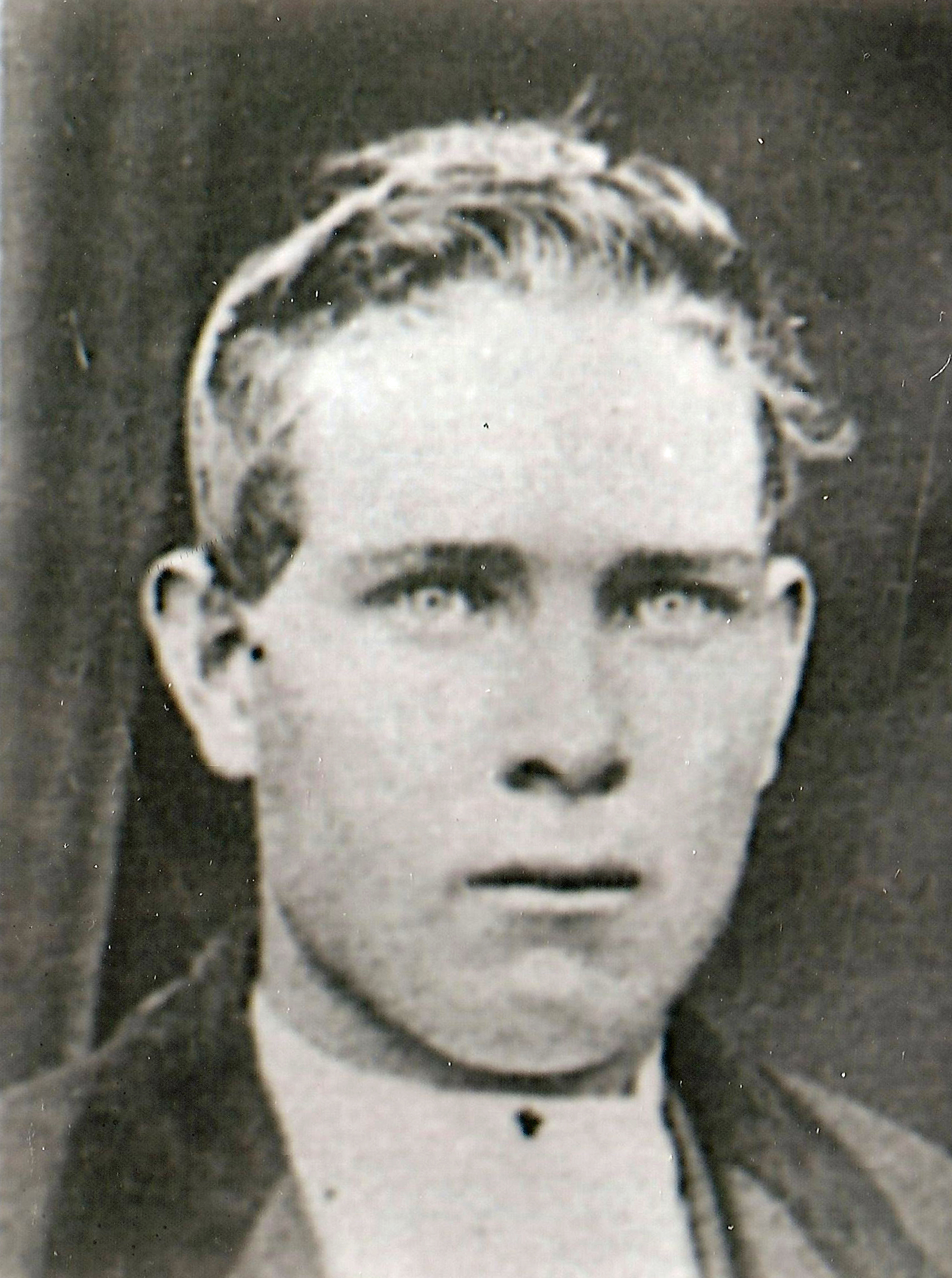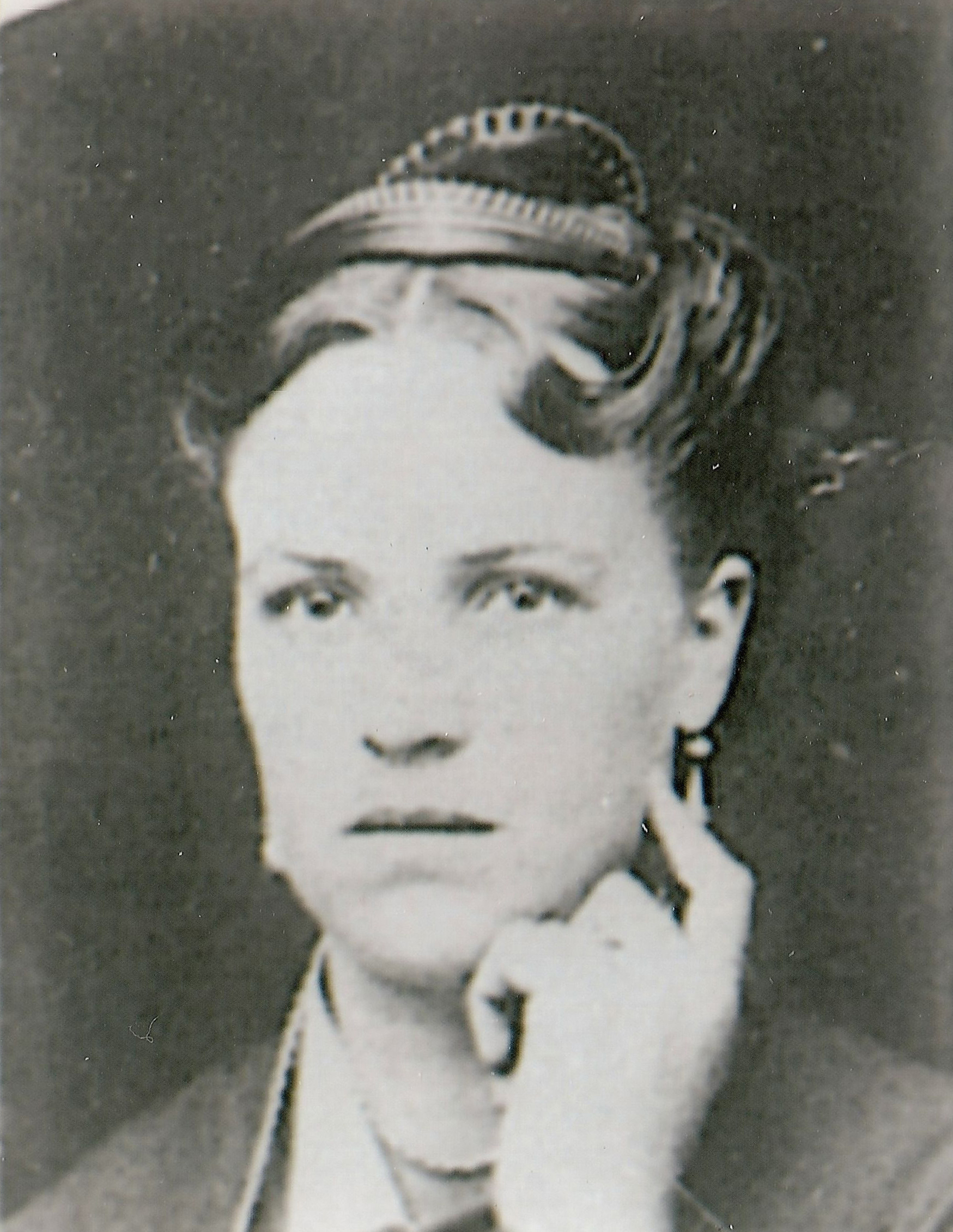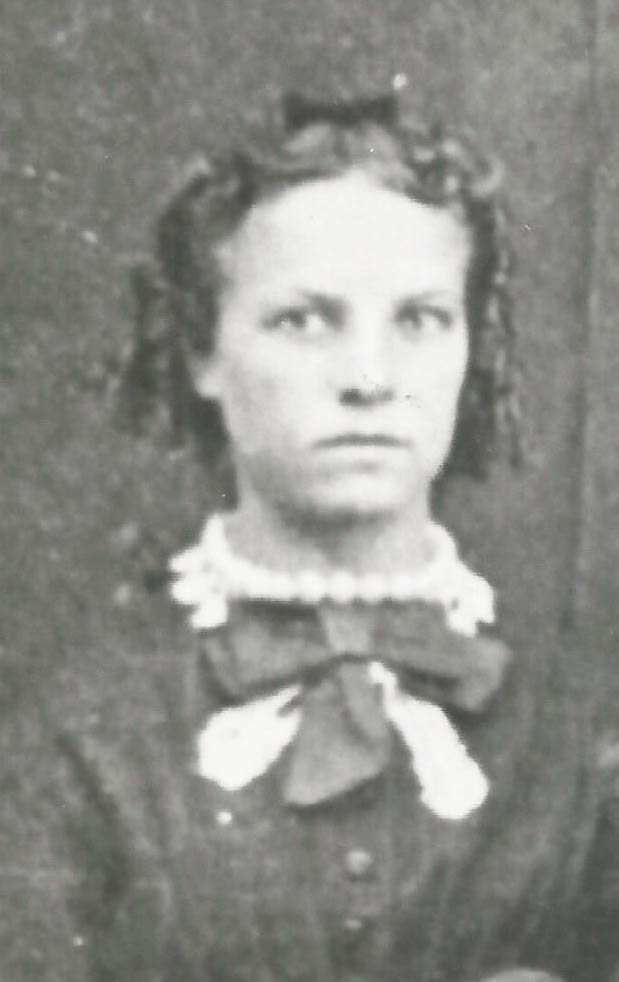Photos
Right-click [Mac Control-click] to open full-size image:

David Murie Hunter

Sarah Jane Urie

Sarah Jane Urie
David Murie Hunter
Born: 14 July 1857 at San Bernardino, San Bernardino, California, USA
Parents: David Murie and Mary Ann Muir
Married: Sarah Jane Urie, 8 October 1879
Died: 22 October 1930 at Cedar City, Iron, Utah, USA
Sarah Jane Urie
Born: 20 December 1860 at Cedar City, Iron, Utah, USA
Parents: John Main Urie and Sarah Ann McMillan
Died: 20 November 1939 at Cedar City, Iron, Utah, USA
LIFE SKETCH OF DAVID AND SARAH JANE URIE HUNTER
After 'Uncle Sam’s Blue Jackets' got through with their trimming up of the Navajos, in northeastern Arizona in the late (eighteen)sixties, under the leadership of Kit Carson, the Indians were left in poor circumstances. They crossed the Colorado River and from the scattered settlements and lone ranches appropriated what they wanted.
The Mormons could not stand this because they were in serious circumstances too, so the Church sent missionaries to make peace with the Indians and a treaty was made followed by an exchange of gifts and the smoking of the peace pipe.
Not long after this the Navajos crossed the river on a friendly expedition and were caught in a bad snow storm. They had nothing to eat and because of their great need of food killed a calf. The owner, who was not a Mormon, came upon them and killed three of the four Indians and wounded the other one. The wounded Indian who was a member of an influential family in the tribe made his way back and his people declared war to the death against the settlers.
When they started attacking again the Mormon leaders were shocked and surprised. They drafted missionaries to go to the Indians again and they convinced them that it was not Mormon people who had done the killing, but non-Mormons who were robbing the Mormons too. The Indians were loaded up again with gifts and assured of the desire on the part of the Mormon people for friendship and peace. It was then decided by the church leaders that if they could make a settlement in this Indian territory that it would by a more lasting help than to just send missionaries, so with this in mind, a company of Latter-day Saints were called to establish an outpost and make peace.
A party of twenty-five men with Silas Smith as their leader were sent to find a route. Among this party was George, Urie, Sarah's older brother, and Kuman Jones, as well They went to Lee’s Ferry and thence to Tuba City. In the meantime a party was sent from Escalante to find a more direct route. They came to the Hole-In-The-Rock and looking down saw the Colorado River. They returned and reported that a road could be made, and that it was clear sailing. This report was made without study and without knowing what they would find on the other side of the river. It is felt by many that this report was prompted more by the desire to encourage travel through the village of Escalante, than to find a feasible route.
About seventy five families were called from Southern Utah to settle San Juan County. My father and mother, David Hunter and Sarah Jane Urie were among this company. At the time they were called they were sweethearts and were advised to get married before starting with the caravan of saints. They were married on the 4th of October 1879 and left Cedar City on the 8th. John and Harriet Corry Gower (sister of Andrew Corry), were another young couple who went. These four young people were jovial and full of fun and helped to bring life to the party and to cheer the other travelers up. For these two couples this trip was like a honeymoon and, by the way, when my parents left they took provisions with them to last for a year. Most of these provisions were wedding presents. They filled their wagon with five seamless sacks of corn, flour, five gallons of honey, two cheese, one tub salted pork, lots of dried fruits and vegetables. Preserves and jams. Five gallons of butter, seed corn, grains of all kinds, small garden seeds and six peach stones (which they planted these stones and they grew), Bedding, clothing, and homemade soap.
The saints from St. George started out picking the other families up as they came north. They organized the company in Parowan and left through Little Creek and Bear Valley, going by way of Panguitch, Red Canyon, Widstoe and Escalante. Sarah's brother, George, who had just returned from the southern exploration route, was also among the travelers.
The going was hard and long being winter. But they were a courageous group and would not have turned back for anything. It took fifty-two days to reach the river. The next would be the hardest. They had the task of descending a 2,000 foot drop with the river below them. They made camp on the plateau while the men made the road. They were jovial people and would dance almost every night. Samuel Cox was the fiddler. It was while they were camped on the rocks that they celebrated mothers 20th birthday. One shot was fired and a bugle was played as a salute to her and then they danced.
Sarah J. Hunter wrote this letter to a friend Mary McConnell daughter of William McConnell while they were still camped on the plateau.
"Dear Friend Mary: We are out in the world end can’t see nothing but red rocks and thats about all. When I get so lonesome I just go out and stand and look at all the hills to see which is the prettiest, but they are all alike. There is none like the Cedar Mountains. We have been here in the same place for six weeks. I was never so sick of a place in my life as I am this but we will have a change soon. We are thinking of moving in two or three days. I must quit as the man is going back before long and will take my letters. I will write and tell you how we are when we get in San Juan in our little log cabin. I tell you I will be proud of it, for living in a wagon box is too small for us to cook and sleep. Well Mary, when you are married and the roads get good come out and give us a little visit. Well, its all in our lifetime. We are happy where ever we are. Sarah J. Hunter"
The day finally came when they were to cross the river, January 23, 1880. There were eight-two wagons and one thousand head of stock and two hundred and fifty men, women and children. The wagons were cross locked with logs and heavy rocks attached to hold them back. The people made there way down the rocky descent on foot.
Father lost his health cutting the ice and forging the stream to help the cattle across. It caused him to have rheumatic fever from which he suffered the rest of his life.
When they got to Bluff City, the Navajo Indians were there. They were mean and treacherous. They were also wealthy. They had clothes made of velvet decorated with little silver bells made from silver they had mined. Mother could joke and laugh with the Indians and got along fine with them. Her patriarchal blessing had promised her that she would fulfill a mission among the Indians.
At one time an Indian squaw came to the Lyman home and demanded a pair of scissors. She picked the scissors up and wouldn’t put them down. Mrs. Lyman showed her a pistol, but didn’t threaten her with it. Within several hours about fifty Indians surrounded the house and demanded Mrs. Lyman. Brother Lyman hid her for the time being, and then moved her to another place. They finally gave them flour, a beef and other provisions to make peace among the Indians.
By this time Mother found that she was with child, and she wanted very badly to come back to Cedar City to have her baby and to have her mothers care (her mother was a mid-wife set apart by the church for this purpose). Thus, they were excused from the mission, and started on their journey back home. Before they left however they gave what provisions they had left to Bishop Neilson to share among the needy families. Brother Lyman went with them to the river. Some men there had a lifeboat with which to transport the people across and would allow no one to ride across in their wagons. Mother wanted to cross in the wagon so that she wouldn’t have to see the water. She hid in the wagon under the mattress and wouldn’t answer her husband’s call. When he found her, Brother Lyman told her that she had to cross in the boat, and she told him that she just couldn’t. Brother Lyman asked father to assist him in administering to her. This they did and she got in the boat. Brother Lyman sat on one side of her and father sat on the other side, with his arms around her. They reached the other side safely, but mother was still frightened. Father asked Brother Lyman to administer to her again, and to stay with them for a little while and then they would go on.
In July, they had a baby girl whom they called Agnes, which of course is me, and two years later they had another little girl.
Two months after my sister was born we left on another mission to the same country. They were traveling through Indian territory, and when they god back to the Indian trading post the owner told them that the Navajos had been very destructful, but he believed that they had quieted down. When father and mother got near the Hole-In-The-Rock they could see two horsemen coming toward them. As they neared they could see that it was an Indian and his squaw. Mother hid me back of the spring seat. The Indian rode up and jumped off his horse and grabbed the bits of the horses. Mother said, “What will we do?” Father said, “Listen Sarah, if you have never prayed before, pray now. Don’t be afraid. Pray in your heart. Keep quiet. Don’t murmur.” Father stepped out on the single tree back of the horses and held out his hand to the Indian. The Indian and his squaw looked at him and then the Indian offered his hand and they shook hands. Of course, I had to peek out to see what was going on. I was a fair baby, with blonde hair and blue eyes. The Indian had never seen a white child with blond curls and blue eyes before. The Indian said, “We want the little girl. Squaw never saw baby like that. Wants to hold her.” Father passed me to them and then held the bit of their horses so they could not ride away. The Indian held me and said, “Pretty girl. Pretty gold curls.” He then passed me to his squaw and mother said that she loved me and that I patted her cheek. Father told the Indian to let him take the baby and that they would be on their way and that they would not molest the Indians. The Indian handed me back to father and we continued our journey.
A few days after we got back to Bluff City, the mail arrived and there was a package for us from Scotland. My Great Grandmother had sent some red coral beads and a little black satin jacket to me, because I was the oldest great grandchild.
One day Mother dressed me up in my new outfit and we went down to the trading post to get some shoes to go with it. Mother said I was really a beautiful child and looked lovely in my jacket with my long yellow curls.
While I was sitting on the counter trying on shoes, a group of Navajo Indians came up to me and started to play with my beads, and my curls, and cuddled me up to them. The interpreter told mother that I was surely in danger because the Indian’s liked the little girl (me) and my beads so well. He told my mother that they wanted the beads and if they didn’t get them, they would kidnap her little girl. She was beside herself with fear, and anxiety, and just didn’t know what to do. She wanted desperately to take her child in her arms and run, but she knew that it would do more harm than good. She decided the best and only thing to do was to give the beads to them.
They finally consented to give her just enough to make a strand to go around my neck. They paid
us twenty-five dollars for them, and seeing that I wanted some shoes, bought them for me.
After that the Indian’s always treated by mother better then any other white women in the town.
They all just loved me and treated me with all the love and kindness in the world.
This story shows how courageous and faithful my parents and all the other people were. They
fulfilled their mission and were honorable released.
Sources:
David Murie Hunter, memories, FamilySearch
Right-click [Mac Control-click] to open full-size image:

David Murie Hunter

Sarah Jane Urie

Sarah Jane Urie